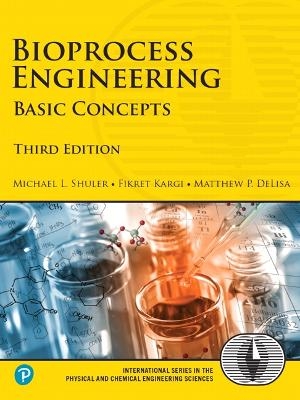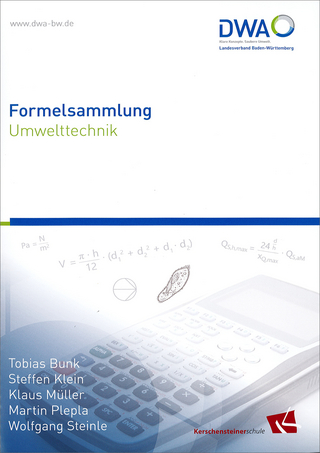
Bioprocess Engineering
Pearson (Verlag)
978-0-13-706270-6 (ISBN)
- Titel erscheint in neuer Auflage
- Artikel merken
Bioprocess Engineering, Third Edition, is an extensive update of the world’s leading introductory textbook on biochemical and bioprocess engineering and reflects key advances in productivity, innovation, and safety.
The authors review relevant fundamentals of biochemistry, microbiology, and molecular biology, including enzymes, cell functions and growth, major metabolic pathways, alteration of cellular information, and other key topics. They then introduce evolving biological tools for manipulating cell biology more effectively and to reduce costs of bioprocesses.
This edition presents major advances in the production of biologicals; highly productive techniques for making heterologous proteins; new commercial applications for both animal and plant cell cultures; key improvements in recombinant DNA microbe engineering; techniques for more consistent authentic post-translational processing of proteins; and other advanced topics. It includes new, improved, or expanded coverage of
The role of small RNAs as regulators
Transcription, translation, regulation, and differences between prokaryotes and eukaryotes
Cell-free processes, metabolic engineering, and protein engineering
Biofuels and energy, including coordinated enzyme systems, mixed-inhibition and enzyme-activation kinetics, and two-phase enzymatic reactions
Synthetic biology
The growing role of genomics and epigenomics Population balances and the Gompetz equation for batch growth and product formation
Microreactors for scale-up/scale-down, including rapid scale-up of vaccine production
The development of single-use technology in bioprocesses
Stem cell technology and utilization
Use of microfabrication, nanobiotechnology, and 3D printing techniques
Advances in animal and plant cell biotechnology
The text makes extensive use of illustrations, examples, and problems, and contains references for further reading as well as a detailed appendix describing traditional bioprocesses.
Dr. Michael L. Shuler is Samuel B. Eckert Professor of Engineering at Cornell University. He directed the School of Chemical Engineering (1998-2002) and was founding James and Marsha McCormick Chair for Biomedical Engineering (2004-2014). He also directs the Center on the Microenvironment and Metastasis (CMM), funded by the National Cancer Institute as a Physical Sciences - Oncology Center. He has received numerous teaching, advising, and research related awards, and has been elected to the National Academy of Engineering and the American Academy of Arts and Sciences. Fikret Kargi is Professor in the Department of Environmental Engineering at Dokuz Eylul University. His interests include bioprocess engineering, environmental biotechnology, wastewater treatment, biotechnology-bioengineering, and waste bioprocessing. He holds a Ph.D. in Chemical/Biochemical Engineering from Cornell. Matthew DeLisa is William L. Lewis Professor of Engineering in Cornell's Department of Chemical and Biomolecular Engineering. His research focuses on understanding and controlling the molecular mechanisms underlying protein biogenesis in the complex environment of a living cell. He has invented numerous commercially important technologies for facilitating the discovery, design and manufacturing of human drugs, and has made seminal discoveries about cellular protein folding and protein translocation. DeLisa has received several awards including an NSF CAREER award, and was named one of the top 35 young innovators by MIT's Technology Review. He was elected as a fellow of the American Institute for Medical and Biological Engineering in 2014.
Part I: The Basics of Biology: An Engineer’s Perspective
Chapter 1: What Is a Bioprocess Engineer?
Chapter 2: An Overview of Biological Basics
Chapter 3: Enzymes
Chapter 4: How Cells Work
Chapter 5: Major Metabolic Pathways
Chapter 6: How Cells Grow
Chapter 7: Stoichiometry of Microbial Growth and Product Formation
Chapter 8: How Cellular Information Is Altered
Part II: Engineering Principles for Bioprocesses
Chapter 9: Operating Considerations for Bioreactors for Suspension and Immobilized Cultures
Chapter 10: Selection, Scale-Up, Operation, and Control of Bioreactors
Chapter 11: Recovery and Purification of Products
Chapter 12: Bioprocess Considerations in Using Animal Cell Cultures
Chapter 13: Bioprocess Considerations in Using Plant Cell Cultures
Chapter 14: Utilizing Genetically Engineered Organisms
Chapter 15: Medical Applications of Bioprocess Engineering
Chapter 16: Multiple Species in Culture
Appendix A: Traditional Industrial Bioprocesses
| Erscheint lt. Verlag | 7.4.2017 |
|---|---|
| Sprache | englisch |
| Maße | 186 x 238 mm |
| Gewicht | 1238 g |
| Themenwelt | Technik ► Umwelttechnik / Biotechnologie |
| ISBN-10 | 0-13-706270-2 / 0137062702 |
| ISBN-13 | 978-0-13-706270-6 / 9780137062706 |
| Zustand | Neuware |
| Haben Sie eine Frage zum Produkt? |
aus dem Bereich


